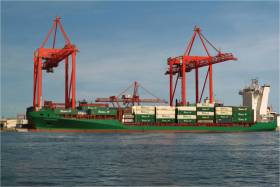Displaying items by tag: Interim Managment Statement
#Q1figures2016 - Irish Continental Group (ICG) parent company of Irish Ferries, today has issued their Interim Management Statement which covers carryings and financial information for the first quarter of 2016, i.e. 1 January to 30 April with comparisons against the corresponding period in 2015. All figures are unaudited.
Consolidated Group revenue in the period was €91.4 million, an increase of 7.4% compared with last year. Net debt at the end of April was €25.9 million compared with €44.3 million at 31 December 2015.
There has been a good start to the year with trading conditions remaining favourable.
Ferries Division
Total revenues recorded in the period amounted to €51.6 million (including intra-division charter income), a 7.1% increase on the prior year.
In this seasonally less significant period for tourism, Irish Ferries carried 90,200 cars, an increase of 5% on the previous year, while freight carryings were 92,300 RoRo units, an increase of 8% compared with 2015.
The ropax ferry MV Kaitaki remained on charter, operating in New Zealand, while the four container ships acquired in late 2015 were fully deployed in the period.
Delivery of the recently acquired vessel "Westpac Express" is expected by late May. It is bareboat chartered to a third party for a firm period of four months with four further one year option periods and a final seven month option at the Charterer's option.
Container and Terminal Division
Total revenues recorded in the period amounted to €42.3 million, a 13.4% increase on the prior year.
Container freight volumes shipped were up 10% on the previous year at 103,400 teu (twenty foot equivalent units), while units handled at our terminals in Dublin and Belfast increased 54% year on year to 96,500 lifts.
Dublin Ferryport Terminals (DFT) throughput increased by 8% on the prior year.
Throughput at Belfast Container Terminals (BCT) increased by 257% reflecting the additional volumes following the award of the concession to operate the larger container terminal at Victoria Terminal 3 (VT3) which commenced in June of the prior year.
Irish Continental Group's Q3 Interim Managment Statement
#ICGinterimStatement - The Irish Continental Group (ICG), parent company of Irish Ferries released today it's Interim Management Statement for Q3, the three months up to the end of September, 2015.
Current trading
In the seasonally most significant quarter of the year, the three months to 30 September, the Group's revenue rose 10.4% to €105.5 million (2014: €95.6 million) while EBITDA rose to €38.6 million, compared with €28.4 million in the same quarter in 2014. Operating profit in the quarter was €34.2 million versus €24.0 million in the same period in 2014.
Summer trading has been strong with volume and revenue growth across the Group's two operating segments; Ferries and Container & Terminal. Group fuel costs in the quarter were €10.3 million (2014: €14.8 million) reflecting lower commodity prices partially offset by a stronger dollar and the amendment of marine environmental regulations requiring the Group to consume more expensive fuel grades.
Volumes 1 July - 7 November
In the period from 1 July 2015 to 7 November 2015 total passengers carried increased by 3%, while cars carried increased by 5%. In the RoRo freight market, Irish Ferries volumes were up 8% in the period.
Container freight volumes for the same period were up 7%. Units lifted at our container ports at Dublin and Belfast were up 51%, with underlying port lifts up 5% after adjusting for Belfast VT3 concession volumes in 2015.
Year to Date Volumes
Cumulatively, in the year to 7 November 2015, total passengers carried were up 3% at 1,530,100, while cars carried were up 6% at 362,900. RoRo freight volumes in the same period were up 10% on last year at 231,500 units.
Container freight volumes were up 3% at 247,500 teu. Units lifted at our container ports rose by 29% to 207,900 lifts, with underlying port lifts up 5% after adjusting for Belfast VT3 concession volumes in 2015.
Cumulative Financial Results to 30 September (unaudited)
Group revenue for the nine months to 30 September 2015 was €248.6 million (2014: €226.3 million), up 9.9%. Revenue in the Ferries division was up 10.8% compared with the comparable period in 2014, while in the Container & Terminal division cumulative revenue was up 8.3% year on year. EBITDA for the nine months was €64.1 million (2014: €42.4 million).
Operating profit for the nine months was €50.6 million compared with €29.2 million in the same period in 2014. Net debt at the end of September was €20.4 million compared with €33.7 million at 30 June 2015. Subsequent to the quarter end the interim dividend of €6.8 million was paid.
Other Developments
Following the award of the Services Concession for the operation of a combined container terminal at Victoria Terminal in Belfast Harbour, the consolidation of our existing container volumes at Belfast has been completed. Progress on developing volumes through Belfast and harnessing the efficiencies of a single terminal are continuing.
As previously reported Afloat, the Group has concluded agreements (on 27 October) for the acquisition of four container vessels at a total cost of €24.2 million, with delivery expected to complete during December. These vessels will be offered to the market on a charter basis.





























































